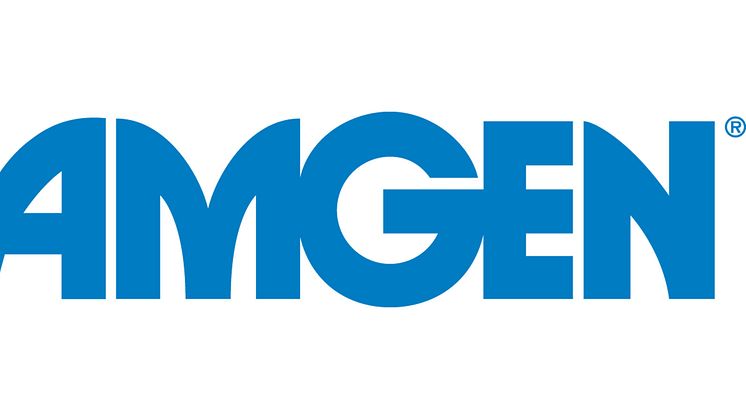
Pressmeddelande -
Phase 3 A.R.R.O.W. Study Of Once-Weekly KYPROLIS® (Carfilzomib) Regimen Meets Primary Endpoint Of Progression-Free Survival In Relapsed And Refractory Multiple Myeloma Patients
Top-line results of the Phase 3 A.R.R.O.W. trial shows KYPROLIS® administered once-weekly at the 70 mg/m2 dose with dexamethasone allowed relapsed and refractory multiple myeloma patients to live 3.6 months longer without their disease worsening than KYPROLIS administered twice-weekly at the 27 mg/m2 dose with dexamethasone. The overall safety profile of the once-weekly KYPROLIS regimen was comparable to that of the twice-weekly regimen.
The study included 478 patients with relapsed and refractory multiple myeloma who received two or three prior lines of therapy, including a proteasome inhibitor and an immunomodulatory agent (IMiD). Patients in the trial treated with the once-weekly KYPROLIS regimen achieved a statistically significant superior progression-free survival (PFS) with a median of 11.2 months compared to 7.6 months for those treated with the twice-weekly KYPROLIS regimen (HR = 0.69, 95 percent CI, 0.54 – 0.88).
"KYPROLIS has been demonstrated to be the most effective proteosome inhibitor available to patients with multiple myeloma," said Sean E. Harper, M.D., executive vice president of Research and Development at Amgen. "We are encouraged by the efficacy and safety profile of KYPROLIS and dexamethasone administered once-weekly in the A.R.R.O.W. study."
The most frequently reported treatment-emergent adverse events (greater than or equal to 20 percent) in either treatment arm were anemia, diarrhea, fatigue, hypertension, insomnia and pyrexia.
About A.R.R.O.W.
The A.R.R.O.W. (RAndomized, Open-label, Phase 3 Study in Subjects with Relapsed and Refractory Multiple Myeloma Receiving Carfilzomib in Combination with Dexamethasone, Comparing Once-Weekly versus Twice-weekly Carfilzomib Dosing) trial evaluated approximately 478 patients with relapsed and refractory multiple myeloma who have received at least two but no more than three prior therapies, including bortezomib and an IMiD. Those included in the study were randomized to receive once-weekly KYPROLIS (20 mg/m2 on day 1 of cycle 1; 70 mg/m2 on days 8 and 15 of cycle 1; and 70 mg/m2 on days 1, 8 and 15 of subsequent cycles) with dexamethasone (40 mg) versus twice-weekly KYPROLIS (20 mg/m2 on days 1 and 2 of cycle 1; 27 mg/m2 on days 8, 9, 15 and 16 of cycle 1; and 27 mg/m2 on days 1, 2, 8, 9, 15 and 16 of subsequent cycles) with dexamethasone (40 mg). The primary endpoint of the trial was PFS, defined as the time from randomization to disease progression or death. Secondary endpoints included overall response rate, overall survival, and safety and tolerability. The trial was conducted in approximately 100 sites worldwide. For more information about this trial, please visit www.clinicaltrials.gov under trial identification number NCT02412878.
About Multiple Myeloma
Multiple myeloma is an incurable blood cancer, characterized by a recurring pattern of remission and relapse.1 It is a rare and life-threatening disease that accounts for approximately one percent of all cancers.2,3 In the U.S., there are more than 118,000 people living with, or in remission from, multiple myeloma.4 Approximately 30,280 Americans are diagnosed with multiple myeloma each year and 12,590 patient deaths are reported on an annual basis.4
About KYPROLIS® (carfilzomib)
Proteasomes play an important role in cell function and growth by breaking down proteins that are damaged or no longer needed.5 KYPROLIS has been shown to block proteasomes, leading to an excessive build-up of proteins within cells.5 In some cells, KYPROLIS can cause cell death, especially in myeloma cells because they are more likely to contain a higher amount of abnormal proteins.5,6
KYPROLIS is approved in the U.S. for the following:
- In combination with dexamethasone or with lenalidomide plus dexamethasone for the treatment of patients with relapsed or refractory multiple myeloma who have received one to three lines of therapy.
- As a single agent for the treatment of patients with relapsed or refractory multiple myeloma who have received one or more lines of therapy.
KYPROLIS is also approved in Argentina, Australia, Bahrain, Canada, Hong Kong, Israel, Japan, Kuwait, Lebanon, Macao, Mexico, Thailand, Colombia, S. Korea, Qatar, Switzerland, Singapore, Taiwan, Jordan, Egypt, Saudi Arabia, United Arab Emirates, Turkey, Russia, Brazil, India, Oman and the European Union. Additional regulatory applications for KYPROLIS are underway and have been submitted to health authorities worldwide.
IMPORTANT SAFETY INFORMATION
Cardiac Toxicities
- New onset or worsening of pre-existing cardiac failure (e.g., congestive heart failure, pulmonary edema, decreased ejection fraction), restrictive cardiomyopathy, myocardial ischemia, and myocardial infarction including fatalities have occurred following administration of KYPROLIS. Some events occurred in patients with normal baseline ventricular function. Death due to cardiac arrest has occurred within one day of KYPROLIS administration.
- Monitor patients for clinical signs or symptoms of cardiac failure or cardiac ischemia. Evaluate promptly if cardiac toxicity is suspected. Withhold KYPROLIS for Grade 3 or 4 cardiac adverse events until recovery, and consider whether to restart KYPROLIS at 1 dose level reduction based on a benefit/risk assessment.
- While adequate hydration is required prior to each dose in Cycle 1, monitor all patients for evidence of volume overload, especially patients at risk for cardiac failure. Adjust total fluid intake as clinically appropriate in patients with baseline cardiac failure or who are at risk for cardiac failure.
- Patients ≥ 75 years, the risk of cardiac failure is increased. Patients with New York Heart Association Class III and IV heart failure, recent myocardial infarction, conduction abnormalities, angina, or arrhythmias may be at greater risk for cardiac complications and should have a comprehensive medical assessment (including blood pressure and fluid management) prior to starting treatment with KYPROLIS and remain under close follow-up.
Acute Renal Failure
- Cases of acute renal failure and renal insufficiency adverse events (including renal failure) have occurred in patients receiving KYPROLIS. Acute renal failure was reported more frequently in patients with advanced relapsed and refractory multiple myeloma who received KYPROLIS monotherapy. Monitor renal function with regular measurement of the serum creatinine and/or estimated creatinine clearance. Reduce or withhold dose as appropriate.
Tumor Lysis Syndrome
- Cases of Tumor Lysis Syndrome (TLS), including fatal outcomes, have occurred in patients receiving KYPROLIS. Patients with multiple myeloma and a high tumor burden should be considered at greater risk for TLS. Adequate hydration is required prior to each dose in Cycle 1, and in subsequent cycles as needed. Consider uric acid lowering drugs in patients at risk for TLS. Monitor for evidence of TLS during treatment and manage promptly. Withhold KYPROLIS until TLS is resolved.
Pulmonary Toxicity
- Acute Respiratory Distress Syndrome (ARDS), acute respiratory failure, and acute diffuse infiltrative pulmonary disease such as pneumonitis and interstitial lung disease have occurred in patients receiving KYPROLIS. Some events have been fatal. In the event of drug-induced pulmonary toxicity, discontinue KYPROLIS.
Pulmonary Hypertension
- Pulmonary arterial hypertension (PAH) was reported in patients treated with KYPROLIS. Evaluate with cardiac imaging and/or other tests as indicated. Withhold KYPROLIS for PAH until resolved or returned to baseline and consider whether to restart KYPROLIS based on a benefit/risk assessment.
Dyspnea
- Dyspnea was reported in patients treated with KYPROLIS. Evaluate dyspnea to exclude cardiopulmonary conditions including cardiac failure and pulmonary syndromes. Stop KYPROLIS for Grade 3 or 4 dyspnea until resolved or returned to baseline. Consider whether to restart KYPROLIS based on a benefit/risk assessment.
Hypertension
- Hypertension, including hypertensive crisis and hypertensive emergency, has been observed with KYPROLIS. Some of these events have been fatal. Monitor blood pressure regularly in all patients. If hypertension cannot be adequately controlled, withhold KYPROLIS and evaluate. Consider whether to restart KYPROLIS based on a benefit/risk assessment.
Venous Thrombosis
- Venous thromboembolic events (including deep venous thrombosis and pulmonary embolism) have been observed with KYPROLIS. Thromboprophylaxis is recommended for patients being treated with the combination of KYPROLIS with dexamethasone or with lenalidomide plus dexamethasone. The thromboprophylaxis regimen should be based on an assessment of the patient's underlying risks.
- Patients using oral contraceptives or a hormonal method of contraception associated with a risk of thrombosis should consider an alternative method of effective contraception during treatment with KYPROLIS in combination with dexamethasone or lenalidomide plus dexamethasone.
Infusion Reactions
- Infusion reactions, including life-threatening reactions, have occurred in patients receiving KYPROLIS.
- Symptoms include fever, chills, arthralgia, myalgia, facial flushing, facial edema, vomiting, weakness, shortness of breath, hypotension, syncope, chest tightness, or angina. These reactions can occur immediately following or up to 24 hours after administration of KYPROLIS. Premedicate with dexamethasone to reduce the incidence and severity of infusion reactions. Inform patients of the risk and of symptoms of an infusion reaction and to contact a physician immediately if they occur.
Hemorrhage
- Fatal or serious cases of hemorrhage have been reported in patients receiving KYPROLIS. Hemorrhagic events have included gastrointestinal, pulmonary, and intracranial hemorrhage and epistaxis. Promptly evaluate signs and symptoms of blood loss. Reduce or withhold dose as appropriate.
Thrombocytopenia
- KYPROLIS causes thrombocytopenia with recovery to baseline platelet count usually by the start of the next cycle. Thrombocytopenia was reported in patients receiving KYPROLIS. Monitor platelet counts frequently during treatment with KYPROLIS. Reduce or withhold dose as appropriate.
Hepatic Toxicity and Hepatic Failure
- Cases of hepatic failure, including fatal cases, have been reported during treatment with KYPROLIS. KYPROLIS can cause increased serum transaminases. Monitor liver enzymes regularly regardless of baseline values. Reduce or withhold dose as appropriate.
Thrombotic Microangiopathy
- Cases of thrombotic microangiopathy, including thrombotic thrombocytopenic purpura/hemolytic uremic syndrome (TTP/HUS), including fatal outcome have occurred in patients receiving KYPROLIS. Monitor for signs and symptoms of TTP/HUS. Discontinue KYPROLIS if diagnosis is suspected. If the diagnosis of TTP/HUS is excluded, KYPROLIS may be restarted. The safety of reinitiating KYPROLIS therapy in patients previously experiencing TTP/HUS is not known.
Posterior Reversible Encephalopathy Syndrome (PRES)
- Cases of PRES have occurred in patients receiving KYPROLIS. PRES was formerly known as Reversible Posterior Leukoencephalopathy Syndrome. Consider a neuro-radiological imaging (MRI) for onset of visual or neurological symptoms. Discontinue KYPROLIS if PRES is suspected and evaluate. The safety of reinitiating KYPROLIS therapy in patients previously experiencing PRES is not known.
Increased Fatal and Serious Toxicities in Combination with Melphalan and Prednisone in Newly Diagnosed Transplant‐ineligible Patients
- In a clinical trial of transplant‐ineligible patients with newly diagnosed multiple myeloma comparing KYPROLIS, melphalan, and prednisone (KMP) vs bortezomib, melphalan, and prednisone (VMP), a higher incidence of serious and fatal adverse events was observed in patients in the KMP arm. KYPROLIS in combination with melphalan and prednisone is not indicated for transplant‐ineligible patients with newly diagnosed multiple myeloma.
Embryo-fetal Toxicity
- KYPROLIS can cause fetal harm when administered to a pregnant woman based on its mechanism of action and findings in animals.
- Females of reproductive potential should be advised to avoid becoming pregnant while being treated with KYPROLIS. Males of reproductive potential should be advised to avoid fathering a child while being treated with KYPROLIS. If this drug is used during pregnancy, or if pregnancy occurs while taking this drug, the patient should be apprised of the potential hazard to the fetus.
ADVERSE REACTIONS
- The most common adverse reactions occurring in at least 20% of patients treated with KYPROLIS in the combination therapy trials: anemia, neutropenia, diarrhea, dyspnea, fatigue, thrombocytopenia, pyrexia, insomnia, muscle spasm, cough, upper respiratory tract infection, hypokalemia.
- The most common adverse reactions occurring in at least 20% of patients treated with KYPROLIS in monotherapy trials: anemia, fatigue, thrombocytopenia, nausea, pyrexia, dyspnea, diarrhea, headache, cough, edema peripheral.
Please see full prescribing information at www.kyprolis.com.
About Amgen's Commitment to Oncology
Amgen Oncology is committed to helping patients take on some of the toughest cancers, such as those that have been resistant to drugs, those that progress rapidly through the body and those where limited treatment options exist. Amgen's supportive care treatments help patients combat certain side effects of strong chemotherapy, and our targeted medicines and immunotherapies focus on more than a dozen different malignancies, ranging from blood cancers to solid tumors. With decades of experience providing therapies for cancer patients, Amgen continues to grow its portfolio of innovative and biosimilar oncology medicines.
References
- Jakubowiak A. Management Strategies for Relapsed/Refractory Multiple Myeloma: Current Clinical Perspectives. Seminars in Hematology. 2012; 49(3)(1),S16-S32.
- GLOBOCAN 2012. Global Prevalence and Incidence. Available at: http://globocan.iarc.fr/old/summary_table_pop_prev.asp?selection=224900&title=World&sex=0&window=1&sort=0&submit=%C2%A0Execute%C2%A0. Accessed on Sept. 7, 2017.
- American Cancer Society. About Multiple Myeloma. Available at https://www.cancer.org/content/dam/CRC/PDF/Public/8738.00.pdf. Accessed on Sept. 7, 2017.
- National Cancer Institute. SEER Stat Fact Sheets: Myeloma. Available at: http://seer.cancer.gov/statfacts/html/mulmy.html. Accessed on September 7, 2017.
- Moreau P, Richardson PG, Cavo M, et al. Proteasome Inhibitors in Multiple Myeloma: 10 Years Later. Blood. 2012; 120(5):947-959.
- Kortuem KM and Stewart AK. Carfilzomib. Blood. 2012; 121(6):893-897.




